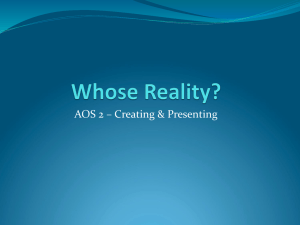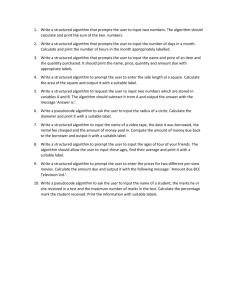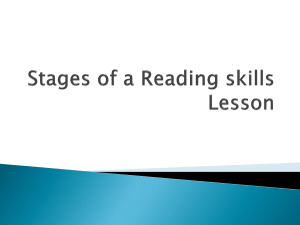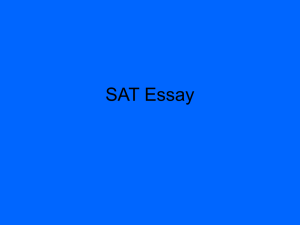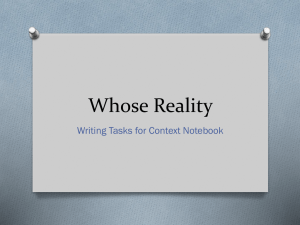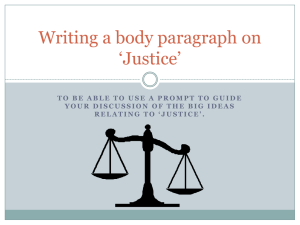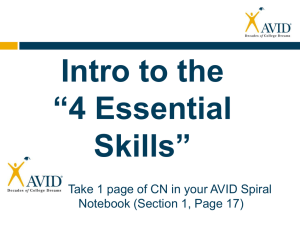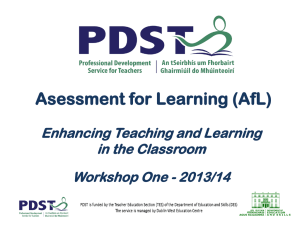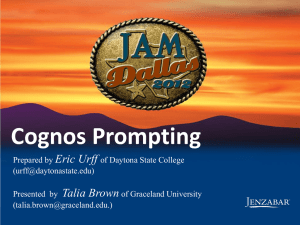Whose Reality Intro - Year 12 English
advertisement
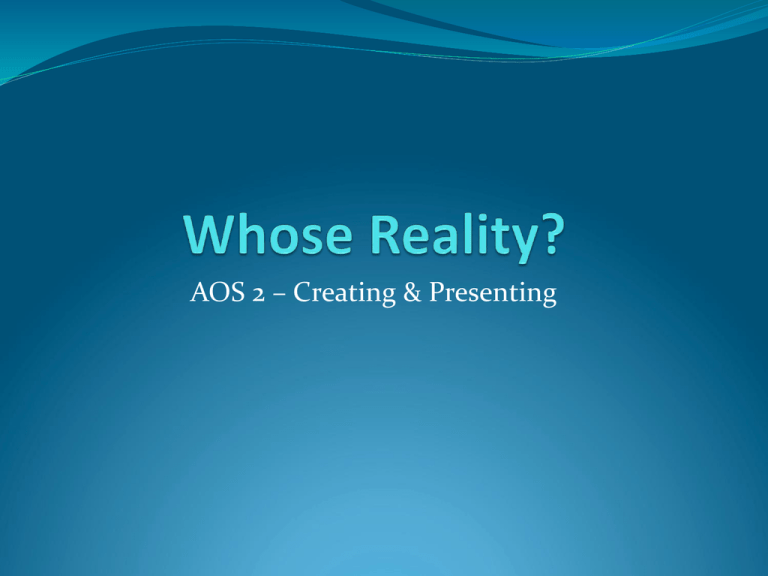
AOS 2 – Creating & Presenting Text Based Unit 3 – Spies Unit 4 – Death of a Salesman Exam – can refer to one or both texts. What is Reality? Reality is a fact, most see it as ‘the truth’ if speaking objectively However, the context is called “Whose Reality?”, leading us to question the concept of personal realities and multiple realities. A question is posed by the context: whose truth is it? How do we justify our truths? Why do we interpret them in this way? What is Reality to You? Activity: Define reality. At this moment what does it mean to you? What makes up your world? What does Freud tell us? “Life, as we find it, is too hard for us; it brings us too many pains, disappointments and impossible tasks. In order to bear it we cannot dispense with palliative measures... There are perhaps three such measures: powerful deflections, which cause us to make light of our misery; substitutive satisfactions, which diminish it; and intoxicating substances, which make us insensible to it.” Sigmund Freud Freud and the Iceberg Freud compares our conscious mind to an iceberg Only the smallest aspect of our minds is perceivable on the surface – so much more is going on underneath You will see this clearly reflected in your texts The Prompt When you do this outcome, you will be asked to respond to a prompt – a statement about reality that you will be asked to explore (agree or disagree). The prompt is usually quite generic (broad/general) so students can explore ideas from either text. It may or may not contain the word reality You are required to deal with the CONCEPTS it raises. Previous Exam Prompts 2012 Exam – ‘Our fantasies can be more powerful than our reality’. 2011 Exam - ‘Shared experience does not mean that people see things the same way.’ 2010 Exam - ‘Sometimes people find themselves living in a world created by other people.’ 2009 Exam - ‘We do not see things as they are. We see them as we are.’ 2008 Exam - ‘We can evade “reality” but we cannot avoid the consequences of doing so.’ The prompt Your piece should clearly address the prompt but does not have to provide a definite ‘answer’ or stick rigidly to the prompt. Shape your ideas around the prompt, using it as a starting point for wider discussion on the context . DO NOT write a generic or pre-prepared piece that is unrelated to the prompt. Assessing key ideas in prompts Highlight/underline the key words Look up any words in the dictionary you’re uncertain of Rephrase the prompt Consider the context ideas that are relevant to it How does this link to your chosen text? What’s your opinion on it? What texts, images, songs, quotes, theories spring to mind? Writing Requirements Expository Persuasive Creative/imaginative ‘Hybrid’ or combined form Texts Draw upon the ideas related to Death of a Salesman by Arthur Miller or Spies by Michael Frayn. In Unit 3 we will do Spies, in Unit 4 we will do Death of a Salesman. In the exam you can draw on both if you want! DO NOT focus only on your selected text/s – these pieces tend to resemble text response essays and can only result in a mid-range mark of 4-7 out of a possible 10. Written Explanation You will have an opportunity to write a written explanation for your SACs This allows you to make the link between your piece and the prompt concrete You can be creative whilst you have this, experimental even You will NOT have an opportunity to write one in the exam Good writing? Dependent on the quality of your writing, the quality of your ideas and your ability to deal with the prompt. ‘There can be no good writing without good ideas.’ Sophisticated understanding of the context; sophisticated and clear expression. Be accurate and specific not general and vague. Assessors have found that the weakest responses are those that are too general and only ‘superficially’ explore key ideas. Context Notebooks Your context notebook will be a valuable resource for gathering ideas for writing. You will complete short writing tasks in this, both in and out of class. You will need to gather ideas for writing in your own time You should use this notebook to plan your Outcomes and refine ideas for writing This will be used as a tool to determine satisfactory results in this outcome. Whose Reality? Yours What is reality? Someone else’s Michael Frayn Multiple realities? Stephen Wheatley Emotional realities? Keith – mother, father Subjective reality? Arthur Miller Objective reality? Willy Loman Real? Truth? Linda, Biff, Happy Unreal? Fake? Constructed realities First Context Notebook Activity… What is the message of this cartoon? Context ideas & statements Reality is hard to define. Reality can be harsh. We all (consciously/subconsciously) seek to avoid reality at times. There can be multiple realities/versions – sometimes these clash. We can consciously shape our reality – writing is reflective and involves revising reality There are universal truths We all perceive reality differently – why? Our past experiences impact on our perceptions Significant people/events compel change Sample prompts 'The line between illusion and madness is a fine one.' 'When we attempt to make order out of chaos then we risk distorting reality.' 'Believing is seeing. The reality that we perceive is the reality that we want to perceive.' 'An experience becomes real when others feel what it felt like for you.' 'People's memories shape their understanding of themselves, their world and others.' Sample prompts cont… 'We can never attain a fully objective view of reality because we remain trapped in the prison of our subjectivity.' 'When competing realities clash the result can be only tragedy.' 'Our sanity depends on a clear understanding of what is and isn't real.' 'A person's self-image can interfere with their ability to perceive reality clearly.' Sample prompts cont… ‘There are no facts, only interpretations.’ ‘The truth means different things to different people.’ ‘People re-create their memories to suit their current reality.’
